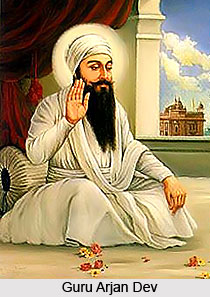 Guru Arjan Dev Ji is the renowned fifth Guru of Sikhism who followed the footsteps of Guru Ram Das. He was born in Amritsar, Punjab on 15th April 1563 and died on 30 May 1606 in Lahore. Guru Arjan served as the head of Sikhism for a long time and accomplished a lot during his regime. The most important work of Arjan Dev was the compilation of the Adi Granth. He completed this scripture by collecting the works of the first four Gurus and dictated it in the form of verses in 1604. Guru Arjan is renowned because of his multifarious activities.
Guru Arjan Dev Ji is the renowned fifth Guru of Sikhism who followed the footsteps of Guru Ram Das. He was born in Amritsar, Punjab on 15th April 1563 and died on 30 May 1606 in Lahore. Guru Arjan served as the head of Sikhism for a long time and accomplished a lot during his regime. The most important work of Arjan Dev was the compilation of the Adi Granth. He completed this scripture by collecting the works of the first four Gurus and dictated it in the form of verses in 1604. Guru Arjan is renowned because of his multifarious activities.
Guru Arjan had organised the Masand system which constitute a group of representatives who taught and spread the teachings of the Gurus. He helped in organizing Langars that were designed from the start to stress the idea of equality and a casteless society. Guru Arjan Dev highlighted the system of voluntary offerings and for the common cause and the sharing of one`s earnings was made regular. The representatives of the Guru collected contributions from their respective areas and sent them to the common treasury.
In addition to that, the Guru had a well-organised central establishment which included the maintenance of a contingent of horses and elephants. He encouraged his followers to trade in horses and in the long run, the Sikhs became good horsemen and formed later the nucleus of military power. These features were important developments during, Guru Arjan`s time as this was the preparatory session for the military organisation which was to follow from the time of the Sixth Guru.
Further major contributions of Guru Arjan were his intervention on behalf of the local peasantry with Emperor Akbar to get the excessive levy of land revenue reduced. During this time the Guru became famous as Sacha Patshah (True Emperor) in the Sikh community. Thus Guru Arjan Singh earned a special position among the Sikhs for guiding, governing and influencing the lives of the Sikhs both in the temporal and the spiritual fields.




















